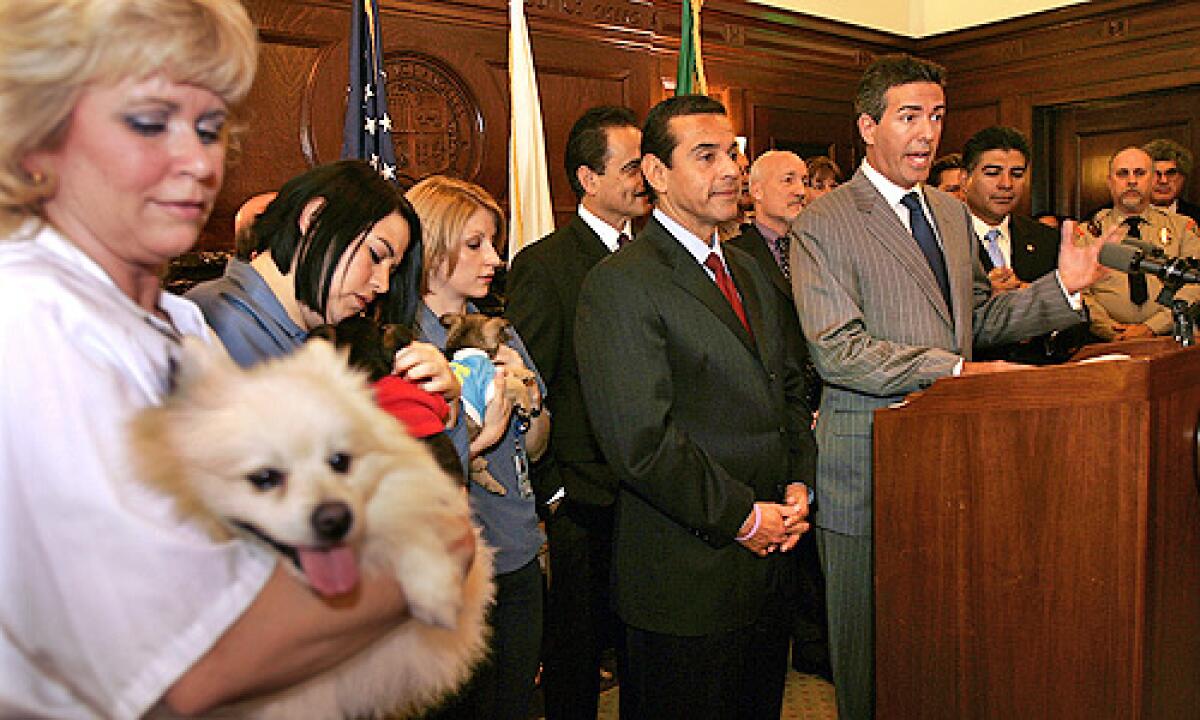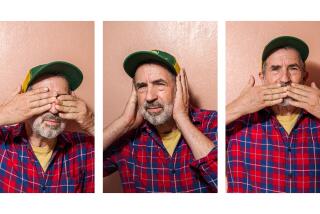Wayne Pacelle works for the winged, finned and furry

Animal welfare activists don’t usually invoke the National Rifle Assn. as a role model. After all, hunting animals for sport and protecting animals from sport hunters are mutually exclusive endeavors.
But Wayne Pacelle, chief executive of the Humane Society of the United States, finds something to admire about the gun rights group: its brute strength.
“Our movement needs an NRA-type organization to get the job done,” Pacelle said. “There are lots of gun rights groups, but the one that you hear about and the one that is feared is the NRA.”
No, he doesn’t want to run an organization that is only feared.
“I’d rather be loved -- and feared.”
In the four years since the 42-year-old vegan -- he neither eats nor wears animal products -- ascended to the top spot at the Humane Society, Pacelle has retooled a venerable organization seen as a mild-mannered protector of dogs and cats into an aggressive interest group flexing muscle in state legislatures and courtrooms.
His predecessors may have built the Humane Society’s wealth, but he doubled its net assets to nearly $207 million. (The Humane Society is the largest and richest among hundreds of nonprofit animal advocacy membership organizations in the country.) He didn’t pioneer the use of hidden-camera video to reveal animal cruelty (People for the Ethical Treatment of Animals did), but he has increased the number of Humane Society undercover investigators and packaged the resulting videos with the flair of TMZ and the intensity of “60 Minutes.”
The Humane Society’s hidden-camera video of cows at a Chino slaughterhouse being dragged, pushed and hosed got the plant closed in February and sparked the largest meat recall in U.S. history. Recently, the Humane Society released video of abuse of dairy cows at five animal auctions.
“Before Wayne took over, you never heard of anything that HSUS was doing that was proactive,” said Jane Garrison, a longtime animal welfare activist from Redondo Beach. “Since Wayne has taken over, it’s an extremely proactive group.”
But the large profile casts a large shadow. Pacelle and his organization have become targets for critics on all sides of animal issues: Some say he’s just a radical masquerading in business suits, bent on abolishing meat-eating. (He’s not.) And there are animal welfare advocates who argue he hasn’t been aggressive enough.
Pacelle eschews the gimmicks of radicals who make their points by disrupting fashion shows featuring fur-clad models or handing out “unhappy meals” outside fast-food restaurants containing toy animals with slit throats.
Instead, his group litigates, launches public awareness campaigns and lobbies against animal fighting, puppy mills, seal hunting and killing for fur, “canned” hunting of animals trapped in reserves and the cruelty of factory farming. He also set up a separate political arm to campaign against politicians with poor records on animal-related issues.
Along the way, the organization has become adept at promotion. Humane Society officials staged an elaborate dinner last year at Spago at which chef-owner Wolfgang Puck announced that he would use only the eggs of cage-free hens in his products and would no longer serve foie gras, which is made from the livers of ducks and geese that are force-fed.
Pacelle is particularly proud of the Humane Society’s track record using ballot initiatives.
One of its most ambitious campaigns, launched with Farm Sanctuary, a longtime farm animal protection group, is underway in California. The Prevention of Farm Animal Cruelty Act -- Proposition 2 on the Nov. 4 ballot -- would ban small, confining crates or cages for egg-laying hens, veal calves and pregnant sows. No portion of that measure has ever survived a trip through the Legislature of this agricultural state.
Pacelle casts it as a no-brainer for voters. “I don’t believe that the people of California are going to vote against a measure that simply says that animals raised for food should have an opportunity to turn around.”
Pacelle retains the lanky grace of the ranked high school tennis player he once was. Tall and good-looking, his dark hair flecked with gray, he garners a certain amount of attention in the animal welfare community, which happens to be significantly populated with women.
“When I first saw him, I almost fell into a swimming pool,” said one woman, a Los Angeles animal welfare advocate, who met him at an event at a private home.
At the Humane Society’s annual Genesis Awards gala this spring, Pacelle, clad in black tie, stood in the middle of the Beverly Hilton Hotel ballroom working the room. Or, rather, he stood there and let the room work him. Surrounded by a hive of supporters and activists, he shook hands, squeezed shoulders, kissed cheeks, laughed easily.
“He’s a very charming man, and that never hurts,” said Ingrid Newkirk, the co-founder of PETA, who has known Pacelle for 20 years. “I’m a rather abrasive sort.”
But Newkirk wishes he would do more. “I am keen that he really go after the pet food manufacturers who still test on animals,” she said. “Wayne has a slower approach.”
Others believe he’s downright radical. “When Wayne Pacelle took over, it ceased being an animal welfare group and suddenly became an animal rights group,” said David Martosko, the director of research for the Center for Consumer Freedom. (Its website says the purpose of the nonprofit group is “to push back” against activists that have “meddled in Americans’ lives.”)
Martosko, a frequent foe of Pacelle, criticized him for not revealing the footage of the Chino slaughterhouse abuse as soon as the undercover investigator turned it in.
The organization presented the videotape to the San Bernardino County district attorney’s office, which took several weeks to decide on charges. Martosko said Humane Society officials should have called the plant and alerted them to the abuses.
“That’s like going to a criminal and saying ‘stop,’ ” said Pacelle, who dismisses Martosko as “a pimp for the industry.”
It’s an uncharacteristic flash of rancor for Pacelle. He generally saves his biting comments for his blog on the Humane Society’s website, where, preaching to the choir, he singles out members of Congress with the worst records on animal issues -- for example, upbraiding those who voted against legislation to prohibit the organized fighting of animals.
Many animal welfare activists spend their lives butting their heads against the walls of the mainstream: municipal governments, public shelter systems, zoos, corporations, ranchers, farmers. Surviving that fuels their passion and toughens their resolve, but it also leads to a kind of obsessiveness that sometimes comes off -- to those in the mainstream -- as craziness.
Their dedication can be cloistering. Their lives are about e-mail crusades, protests and the passels of animals they often embrace in their homes. The vegans among them sometimes avoid social gatherings and their groaning boards laden with distasteful meats.
Pacelle escaped much of that isolation because his love of animals is matched only by his fascination with politics. The dog-loving boy who riffled encyclopedia pages for entries on animals became the ambitious man who wants to win. Pacelle was the Humane Society’s chief lobbyist for 10 years before he earned the chief executive position.
He had to lobby for that because people thought he was too young. “This is the best time to unleash me.”
He is sometimes asked if he wants to go into politics.
“I am in politics,” he said.
That approach infuriates his critics in the animal welfare movement.
“We have learned what we can expect under Mr. Pacelle’s tenure,” Nathan Winograd, director of the No Kill Advocacy Center and a well-known supporter of no-kill shelters, has written on his . “Platitudes, cliches, rhetoric, pretty words. But we cannot expect solutions.”
Winograd contends that Pacelle wrongly continues the Humane Society’s acceptance of the status quo: that shelters are overpopulated because the public is irresponsible.
Pacelle says he wants no-kill shelters. “But it’s a community responsibility. The demonizing of shelter directors is mean-spirited, narrow-minded and naive.”
His tenure has had its impolitic moments. He scored low marks for the Humane Society’s handling of the Hurricane Katrina animal rescue, which the group ran from the Lamar-Dixon Fairgrounds outside New Orleans.
“We definitely weren’t ready,” he says.
“I turned the organization upside down to deal with the situation.”
Pacelle does have his monkish side. He says he’s too committed to his work to marry or raise children now. He travels constantly to cities where ballot initiatives, state campaigns and other anti-cruelty programs are underway.
“Any friend or companion has to understand what my schedule’s like and what my level of commitment is to this work,” he said, carefully choosing his words.
Divorced long ago, he lives in a condo in Washington, D.C., with his girlfriend, Christine Gutleben, who runs the Humane Society’s program that reaches out to religious leaders and congregations for support on animal welfare issues.
For years, Pacelle did not even have a pet. But when Gutleben moved in with him, she brought along her cat, Libby.
“He’s interesting with animals,” said Gutleben, 30. “He doesn’t want to bother them or invade their space. He’s like ‘Hello, Libby.’ ” She imitated a formal, masculine voice, then laughed. “I just want to swoop her up and bury my head in her fur. He just lets her be. So, of course, she just crawls on the counters and he lets her crawl up and sit on his chest. If he needs to work, he’ll ask me to remove her.”
Pacelle said he has always loved animals. But growing up in New Haven, Conn., the youngest of four children of a high school teacher father and stay-at-home mother, it never occurred to him that he could make a living connected to animals. He didn’t want to be a veterinarian. Too much “blood and guts.” He figured he would be a lawyer.
Unlike some activists, he can’t trace his dedication to one traumatizing epiphany watching some horrible act of cruelty. His turning point was a bucolic one. He says it occurred while canoeing on a moonlit Lake Superior at midnight the summer between his sophomore and junior years at Yale.
“You’re in this pristine environment,” he said of remote Isle Royale National Park, where he worked as a ranger. “Inside this area, the animals could be protected. It just spoke to me. I could be part of the larger process of protecting animals and the environment.”
Back at school, he turned into something of a zealot. He started the Student Animal Rights Coalition. He introduced vegan food to his dormitory dining hall. “I would get razzed by all these people. That’s how I honed my debating skills.”
Home from college, he lectured his family on the evils of slaughtering animals for food.
“I know that sometimes family dinners would not be pleasant when he was trying to convert us,” said his older brother, Richard Pacelle, chairman of the political science department at Georgia Southern University, chuckling. “I think he takes a much more balanced view of things now.”
“I was kind of strident,” Wayne confirmed. “But I’ve changed.”
Pacelle said he knows he frequently veers away from what he calls the animal movement’s “orthodoxy.” He’s not against “responsible” dog and cat breeding. And he never refers to himself as an animal rights activist, always an animal protection “advocate.”
“The whole ‘rights’ thing is fraught with so much. I’m not sure I believe in any natural right,” he said. “It’s really about human behavior and less about the animals. Animals for the most part just need to be left alone.”
More to Read
Sign up for Essential California
The most important California stories and recommendations in your inbox every morning.
You may occasionally receive promotional content from the Los Angeles Times.











